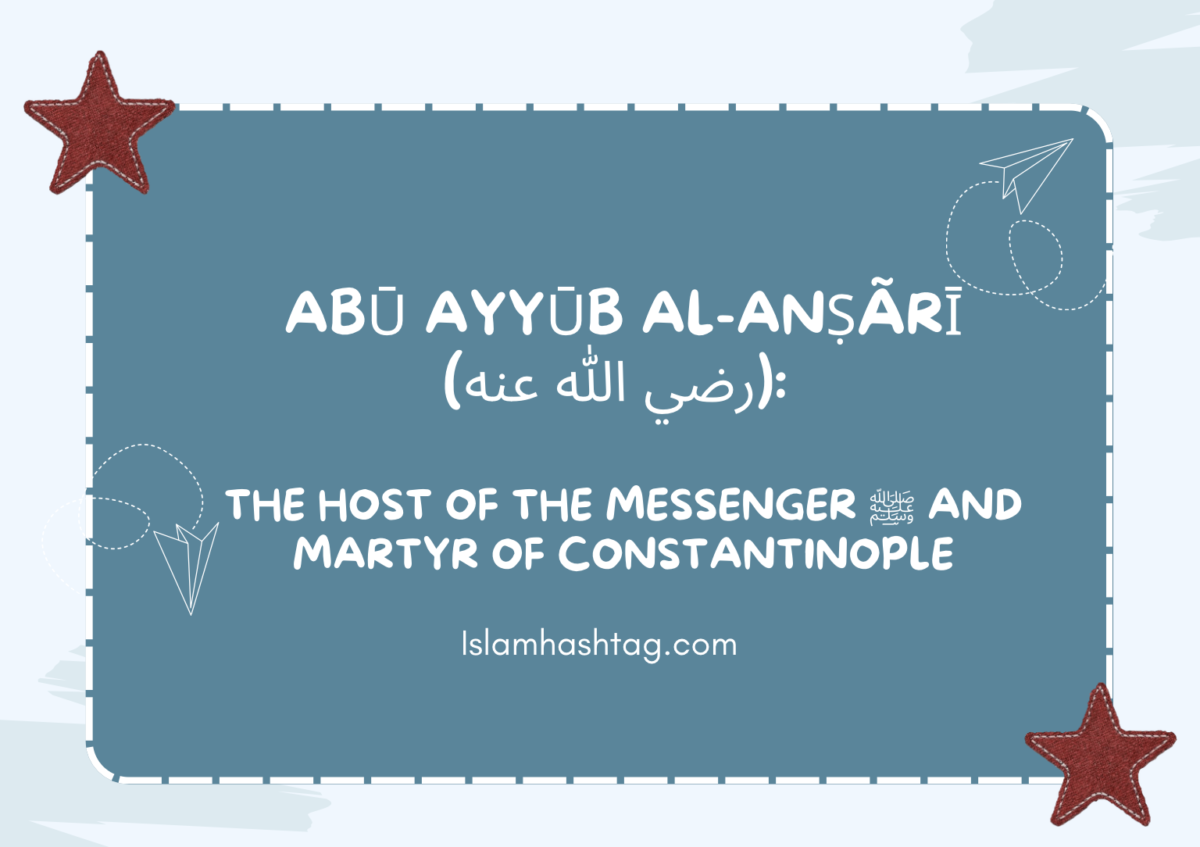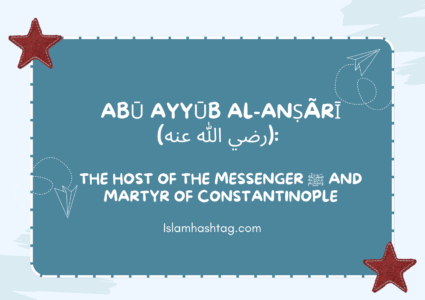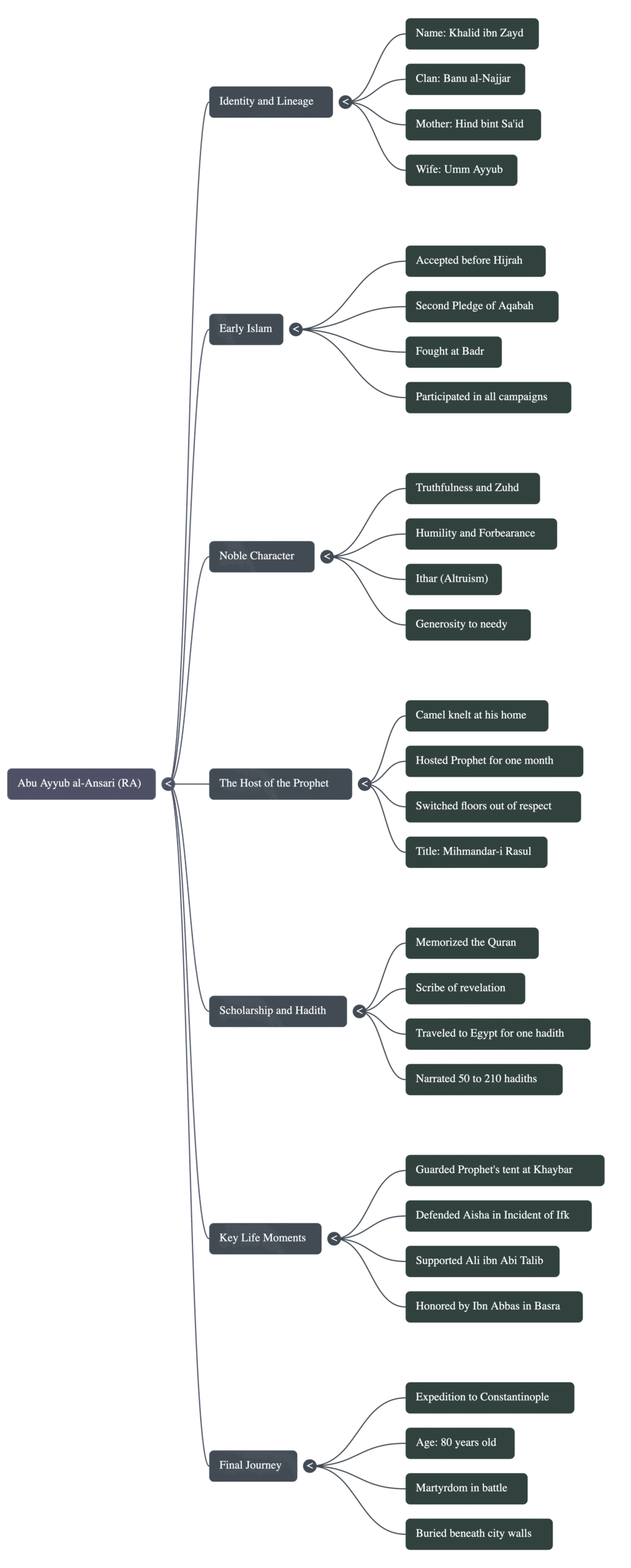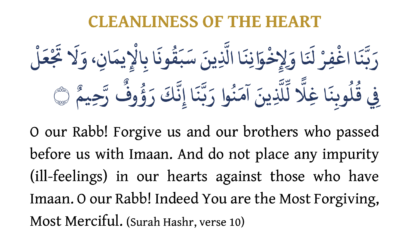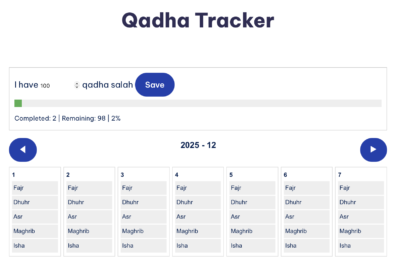Abū Ayyūb al-Anṣārī (رضي الله عنه) Name, lineage, and family
Abū Ayyūb al-Anṣārī (رضي الله عنه) welcomed the Prophet ﷺ into his home and never stopped welcoming the Sunnah into his life. His days stretched from al-ʿAqabah to Badr and Khaybar, shaped by service more than speech, by humility more than acclaim—until his journey ended at Constantinople’s walls, sealed with steadfast faith.
His name is Khalid ibn Zayd ibn Kulayb ibn Thaʿlabah ibn ʿAbd ʿAmr ibn ʿAwf ibn Ghanm ibn Mālik ibn al-Najjār ibn Thaʿlabah ibn al-Khazraj, known by his kunyah Abū Ayyūb al-Anṣārī.
His mother was Hind bint Saʿīd ibn ʿAmr of Banū al-Ḥārith ibn al-Khazraj.
His wife was Umm Ayyūb al-Anṣārīyah, daughter of Qays ibn Saʿīd ibn Qays ibn ʿAmr ibn Imriʾ al-Qays.
He narrated many noble hadiths from the Messenger of Allah ﷺ, and many narrated from him after—his home, heart, and memory all serving the Sunnah.
Embracing Islam and the pledge
Abū Ayyūb al-Anṣārī (رضي الله عنه) accepted Islam before the Hijrah. He traveled to Makkah with the delegation of Madinah for the Second Pledge of ʿAqabah, offering his hands and future to the Prophet ﷺ. He then marched with the Messenger in all the battles and campaigns; after the Prophet’s passing, he did not miss any battle except one. This constancy is the quiet heroism of a believer whose love became action.
His noble character
From the portraits preserved by the early Muslims, Abū Ayyūb embodied:
- Truthfulness, detachment from excess (zuhd), humility before Allah, and love for people.
- Forbearance, generosity to those in need, and respect for elders.
- Lofty manners and freedom from arrogance—those who knew him loved him.
- Īthār (altruism)—serving others and fulfilling their needs ahead of his own.
- A life devoted to daʿwah and striving in Allah’s path out of love for Allah and His Messenger ﷺ.
Courage and service in battle
He witnessed the Battle of Badr—a station that alone ennobles, for those who stood at Badr hold a rank with Allah unlike any other and were called al-Abrār (the righteous). At Khaybar, he assumed a grave duty: guarding the Prophet’s tent throughout the nights of the campaign. The Prophet ﷺ prayed for him, asking that Allah keep harm away from him in reward for his protection and vigilance.
He also witnessed the Pledge of ʿAqabah and the broad conquests that opened lands and hearts. When ʿAlī ibn Abī Ṭālib (رضي الله عنه) went to Iraq to confront the Khawārij, Abū Ayyūb joined him—faithful to truth wherever it called.
Transmission of hadith and scholarship
Abū Ayyūb al-Anṣārī (رضي الله عنه)is counted among the ten who had memorized the Qur’an during the Prophet’s lifetime, and he was one of the scribes of revelation. Among those who learned from him were Companions such as Anas ibn Mālik and al-Barāʾ ibn ʿĀzib, and many of the Tābiʿīn.
His reverence for the Sunnah shines in a single journey: he traveled to Egypt for one hadith—to verify it precisely. As for how many hadith he narrated, reports differ:
- Imām al-Nawawī: about 150 hadith.
- Nūr al-Dīn al-Qarāfī: up to 210 hadith.
- al-Ḥāfiẓ al-ʿIzzī: around 50 hadith.
However we count, the measure of his service lies in care, not quantity.
Moments that live on
The Host of Allah’s Messenger ﷺ
When the Prophet ﷺ entered Madinah on his she-camel, each clan pleaded to host him. He smiled and said to let the camel go—“she is commanded.” At every neighborhood, people tried to halt her; his answer remained the same—gratitude in his smile, tawakkul in his words.
The camel reached the quarter of ʿAdī ibn al-Najjār and knelt by the house of Banū Mālik ibn al-Najjār—Abū Ayyūb’s home. The city’s hearts turned with joy: Allah had chosen that house to hold the Prophet ﷺ.
At first, the Prophet ﷺ stayed downstairs, while Abū Ayyūb al-Anṣārī (رضي الله عنه) and his wife remained upstairs. Abū Ayyūb’s heart recoiled at the thought of being above the Messenger of Allah ﷺ. He pleaded for a change, so the Prophet ﷺ moved upstairs, and Abū Ayyūb and his wife came down. Their honor and care were constant: they cooked and sent food daily. Once they included onion and garlic, and the Prophet ﷺ returned the dish, explaining that he regularly converses with his Lord and does not eat from that plant. They ate it themselves and never sent it to him again. The Prophet ﷺ remained in their home for a month.
This love is still remembered far beyond Arabia. Among the Turks he is honored as “Mihmandar-ı Rasûl”—the Host of the Messenger.
A stand in the Incident of Ifk
When slander spread against our mother ʿĀʾishah (رضي الله عنها), Abū Ayyūb’s response was a model of ḥusn al-ẓann(good opinion). His wife asked if he had heard what the hypocrites were saying. He said he had—and that it was falsehood. Then he asked her, “Would you ever do such a thing?” She replied no. He answered, “If you would not, then ʿĀʾishah—better than you—would never do it.” Allah then sent down the verse:
“If only the believing men and women, when you heard it, had thought well of one another and said, ‘This is an obvious slander.’” (Qur’an 24:12)
At the Prophet’s grave (with a note on its chain)
It is related that Marwān ibn al-Ḥakam once saw a man with his head placed upon the Prophet’s grave. When the man lifted his head, it was Abū Ayyūb. Marwān objected, but Abū Ayyūb al-Anṣārī (رضي الله عنه) replied that he had come to the Messenger of Allah, not to stones, and said he heard the Prophet ﷺ say: “Do not weep for the religion when its people hold it; but weep for it when others hold it.”
Scholars have classified this story as weak, but it conveys the tenderness of his love.
The honor shown by Ibn ʿAbbās (رضي الله عنهما)
When Ibn ʿAbbās (رضي الله عنه)served as governor of Basra during the caliphate of ʿAlī (رضي الله عنه), Abū Ayyūb al-Anṣārī (رضي الله عنه)came to him. In gratitude for the day Abū Ayyūb welcomed the Prophet ﷺ, Ibn ʿAbbās honored him with forty thousand, twenty servants, and house furnishings—a gift of love returned for love.
His final journey: the martyr of Constantinople
In the era of Muʿāwiyah, when he sent Yazīd toward Constantinople, Abū Ayyūb al-Anṣārī (رضي الله عنه) heard the call to jihād. Though eighty years old, he refused to sit back. When his children urged caution, he recited:
“Go forth, whether light or heavy, and strive with your wealth and yourselves in the path of Allah.” (Qur’an 9:41)
He boarded the ship repeating the testimony of faith, and when battle began, he charged with all his strength. He asked his companions to bury him beneath the city walls if he fell, hoping that Allah would raise him on the Day of Resurrection as a believer amidst the disbelievers. He fought until he was killed, his head severed, and he was buried where he had requested. For this, he is remembered as the Martyr of Constantinople.
Lessons for our lives
- Open your home—and heart—to the Sunnah.
Hosting the Prophet ﷺ transformed Abū Ayyūb’s house into a chapter of Sīrah. Let your life host the Sunnah: in your kitchen, your schedule, your speech. - Guard the trust you are given.
From Khaybar’s night watch to Aqaba’s covenant, he guarded what mattered. Guard your prayer, your family, your words. - Have the best opinion of believers.
In the Ifk, Abū Ayyūb modeled Qur’an 24:12. Carry that mercy into conversations, timelines, and judgments. - Answer the call at every age.
“Light or heavy” is the believer’s rhythm. If you can move, move. If you can speak, speak. If you can give, give.
Key takeaways (for quick study)
- Identity & Lineage: Khalid ibn Zayd al-Anṣārī of Banū al-Najjār (al-Khazraj); kunyah Abū Ayyūb. Mother: Hind bint Saʿīd ibn ʿAmr (Banū al-Ḥārith ibn al-Khazraj). Wife: Umm Ayyūb al-Anṣārīyah, daughter of Qays ibn Saʿīd ibn Qays ibn ʿAmr ibn Imriʾ al-Qays.
- Early Islam: Accepted Islam before the Hijrah; present at the Second Pledge of ʿAqabah; attended Badr and all campaigns with the Prophet ﷺ; missed only one battle after the Prophet’s death.
- Character: Truthfulness, zuhd, humility, love of people, forbearance, service to the needy, respect for elders, lofty manners, īthār, and lifelong dedication to daʿwah and striving.
- At Khaybar: Guarded the Prophet’s tent throughout the nights; the Prophet ﷺ prayed for his protection.
- Hadith & Qur’an: Among the ten who memorized the Qur’an in the Prophet’s time; scribe of revelation; teachers and students included Anas and al-Barāʾ; traveled to Egypt for one hadith. Reported hadith counts vary: 150 (al-Nawawī), up to 210 (al-Qarāfī), about 50 (al-ʿIzzī).
- Noble moments: Hosted the Prophet ﷺ in his home for a month; the episode of onion and garlic; defense of ʿĀʾishah in the Ifk with Qur’an 24:12; the grave-side exchange with Marwān (reported with a weak chain); honored by Ibn ʿAbbās with forty thousand, twenty servants, and house furnishings.
- Final chapter: Joined the expedition to Constantinople in old age, citing 9:41; fought until martyrdom, requested burial beneath the city walls, and is remembered as Shahīd al-Qusṭanṭīniyyah.
A closing duʿā
O Allah, be pleased with Abū Ayyūb al-Anṣārī (رضي الله عنه)and all the Companions. Fill our homes with the light that filled his, our nights with the vigilance that guarded Your Beloved ﷺ, and our endings with sincerity and hope. Make us hosts of the Sunnah in every room of our lives, and gather us with the Prophet ﷺ in gardens of nearness. Āmīn.
Discover more from Islam Hashtag
Subscribe to get the latest posts sent to your email.

